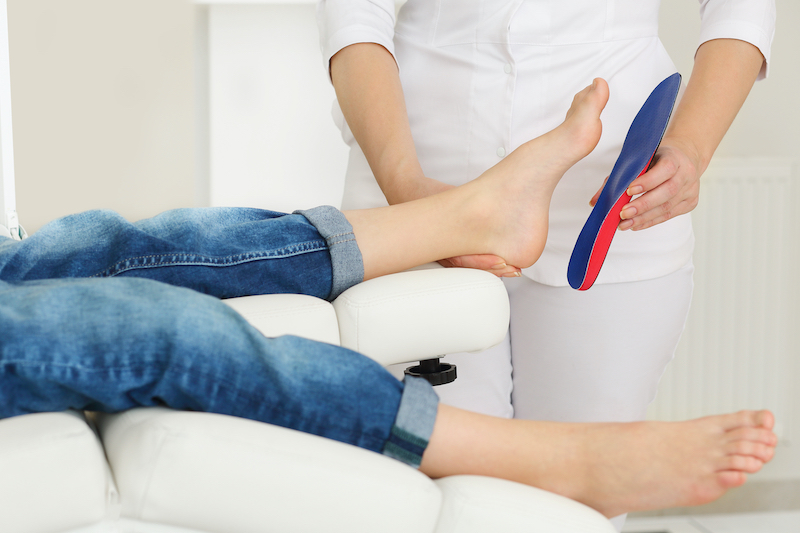The way that your feet connect with the ground has a major impact on how you walk or run and if you’ll experience pain when doing so. The feet are the foundation when walking or running, and if they strike the ground incorrectly during these activities, it can start a chain reaction that leads to problems elsewhere in the body. To address potential problems like foot and ankle pain, orthotics may be recommended to alter the way your foot contacts the ground and correct any imbalances that might be interfering with your stride.
Foot orthotics are molded pieces of rubber, leather, plastic, or synthetic materials that can be inserted into many types of shoes and then worn normally. They are available in various lengths, sizes, and styles, and range from over-the-counter to fully customizable, giving individuals a wide range of options to choose from. The main purpose of orthotics is to support and stabilize the feet by correcting any imbalances in each foot and more evenly distributing one’s bodyweight.
Orthotics Can Benefit Many that are in Pain
Orthotics are usually prescribed for people who are already suffering from foot and/or leg pain, but they may also be recommended to prevent problems from occurring down the line. Two of the more common conditions addressed with orthotics are plantar fasciitis and Achilles tendinitis:
- Plantar fasciitis occurs when the plantar fascia ligament—which connects the back of the heel to the front of the toes—becomes inflamed or irritated, leading to a stabbing or jabbing pain over the arch and under the heel of the foot
- Achilles tendinitis is inflammation of the Achilles tendon, which connects the calf muscles to the back of the heel and allows you to stand on your toes when walking, running, or jumping; this leads to pain, stiffness, and/or swelling at the back of the heel or directly above it
For some patients, orthotics can help to address issues with foot shape—like flat feet or high arches—that may be responsible for plantar fasciitis and other foot-related issues. Orthotics may also be recommended for conditions like shin splints, knee pain, back pain, bunions, hammertoe, and calluses, as well as for individuals who are older, overweight, or have diabetes.
Expert advice on orthotics from our physical therapists
If you’re thinking about giving orthotics a try, the physical therapists at Bacci & Glinn Physical Therapy can help you navigate this process. One of the biggest challenges patients face is choosing the right type of orthotic for their foot type, since there is an abundance of options to choose from. But our physical therapists can evaluate your foot type, gait, and whether you’re dealing with any foot or heel pain, and then recommend the best type of orthotic, which are usually categorized into the following three groups:
- Heel cups
- The smallest and simplest type of orthotic
- Can be easily inserted into most types of shoes
- Made of gel, silicone, or plastic
- Can alleviate pain from plantar fasciitis, Achilles tendinitis, and other conditions by absorbing shock and reducing tension on painful structures
- Orthotic insoles
- Provide arch support and cushioning for some or all of the foot
- Ideal for correcting foot shape issues like flat feet or high arches, which may be contributing to heel pain
- Available in full length, 2/3 length, or 1/2 length sizes
- Can be customized or purchased over the counter
- Worn during the day
- Night splints
- Treat heel pain related to plantar fasciitis throughout the night
- Hold the foot and toes back so the calf muscles, Achilles tendon, and plantar fascia are kept slightly stretched
- Simple and effective way to alleviate heel pain that strikes in the morning with the first steps of the day
- Available in a boot style cast, sleep supports, and sock style supports
For additional guidance on selecting the right foot orthotic, contact:

